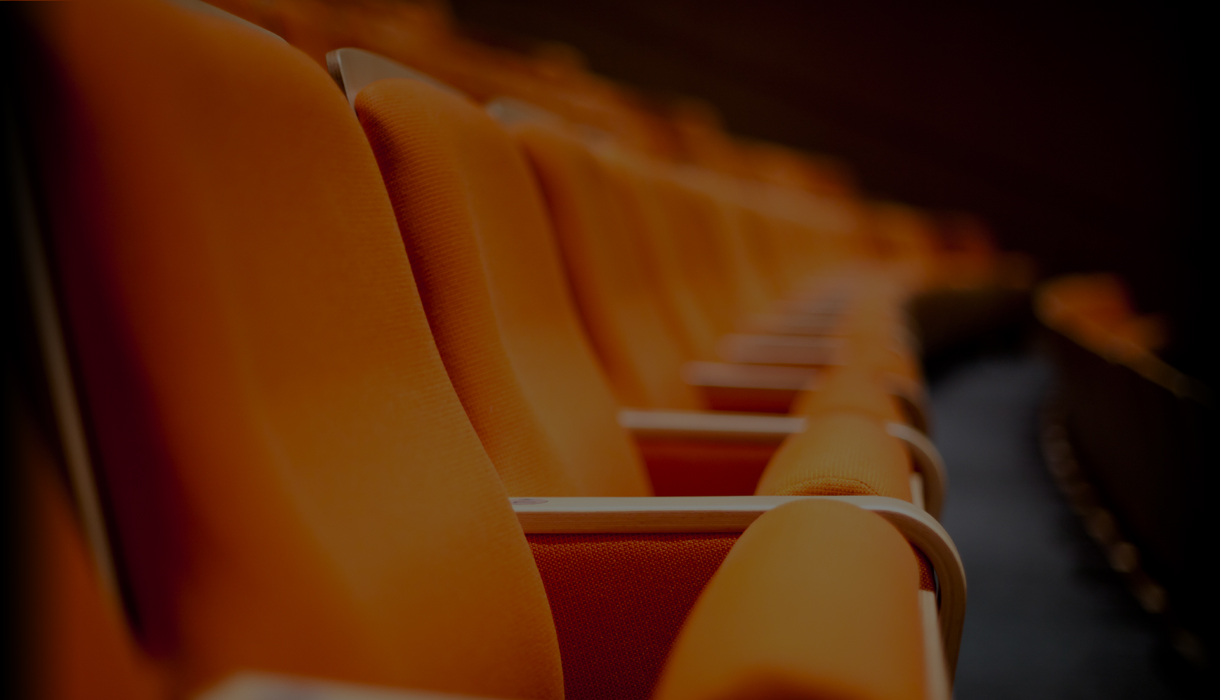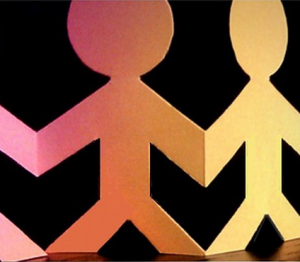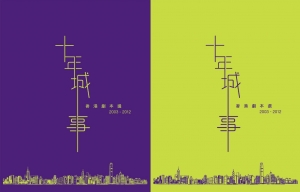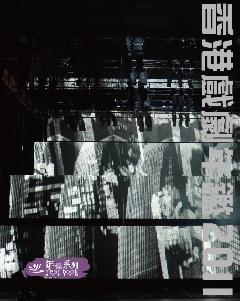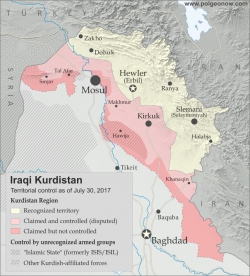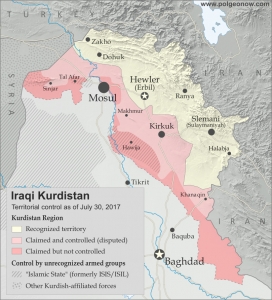2018年2月
A New Period of Theatre in Iraq and Kurdistan
On July 14, 1958, a bloody revolution, led by Brigadier Abd al-Karim Qasim, took place. It liberated Iraq from British rule and also ended the monarchy system in Iraq (1920–58).
The new regime adopted a radical policy that also affected cultural life. Land reform, women’s rights, social reform and education were given priority. Qasim, who himself was partly Kurdish, equated for the first time in Iraq’s history the Kurdish language with Arabic. The Western-controlled Iraq Petroleum Company was nationalised.
However, the Kurdish political leaders were against Qasim’s reforms. War first broke out between the Kurds and the Arabs in Iraq. Later, Kurdish intellectuals made many TV dramas to support the land reform, and to encourage the people to relinquish Feudalism which was the model of power.
Film and theatre education first started at the University of Baghdad in 1959. Many theatre practitioners and activists marked this revolution as a unique opportunity to establish an Iraqi national culture, and to nationalise education and all cultural activities in the country.
The 1958 Revolution had also huge – and largely positive – impact on the theatre front. Asaad Abdulrazaq,[1] a theatre professor, founded a July 14 theatre group performing many plays that advocated societal change. National plays became more important and new adaptations from worldwide theatre were put on stage. Ahmad Fayad Al-Mafraji writes that from 1950 to 1958 several theatre groups were formed. They worked hard to secure their own budgets, pay taxes and administrative fees, but were regulated by the royal regime in the same way as nightclubs. Under such circumstances, these new groups were struggling to stay afloat and many of them closed down (Al-Mafraji 1988: 26–27). But after the Revolution in July 1958, theatres were granted exemption from taxes and fees, so some of the groups managed to start anew. Even though the Revolution had not brought about a democratic system, it gave rise to a kind of modernity that allowed theatre and national cultural activities to grow rapidly. After 1958, theatre groups in Iraq could be divided into three categories:
- Official groups, funded entirely by the state, with full-time employees;
- Independent groups whose members were paid (how much freedom they had depended on the ruling regime);
- Federal groups formed among women, students, farmers, and workers.
At that time, theatre groups were formed according to demographic attributes and employment status. There were many theatre groups in schools inside the cities.
To facilitate public communication and media coverage about theatre, the ministry published a journal entitled Al-Adib Al-Muasir (‘Modern Authors’ in English), but some activities were interrupted for a long time by censorship and political unrest in the country.
In addition, there were several other channels for news and information about theatre and performances in recent Iraq, i.e. after 1958; two TV channels – Sawt Al-Jamahir and Baghdad TV – aired regular programmes about theatre. Theatre was a major means to address issues of public concern and to find ways that could influence Iraqi society, where people have different nationalities and religions. The two TV channels showed a ‘video theatre’ (made by themselves) to discuss a particular subject. During that time, theatre, rather than a kind of art, was more like a possible solution for social ills.
Furthermore, several newspapers had regular slots and permanent space for theatre, including Al-jmhorie, Al-qadsie, Al-thora, Al-Iraq, and Thqafa, which often carried interviews with actors, directors and writers. Some big names from that time included Assad Abdl Al Razaq, Qasm Muhamad, and Yosef Al Ani, all writers and stage artists from 1958 to 1980.
From 1958 to the late 1960s, the Authors Association presented quarterly programmes where theatre personalities were invited to public forums. During the 1970s theatre evolved further, but the new government did not allow any democracy. A new coup ensued in 1968 and led to the rise of the Ba’ath (‘Reborn’) Party, of which Saddam Hussein took control in 1979. From then on, he ruled the country as president for 24 long years.
Theatrical activities in Iraq were also extended to workers and farmers. The workers formed their first group in 1971: 35 non-professional actors set up the Theatre Workers’ House and performed for several years, not just to the workers but to a much wider audience (Al Raa’i 1979: 332–334).
In 1973, farmer or rural theatre groups made their debut at the country’s first theatre festival, and established a public institution for peasants’ culture in 1976. One of its major duties was to bring theatre to the remotest villages. Then came the two main theatre groups in Iraq: one for the Kurdish regions (Kurdish-speaking), and the other for the rest of Iraq (Arabic-speaking), staging performances for peasants and villagers in the open space where all were welcome (Ibid).
Student associations, on the occasion of the World Theatre Day, organised their first theatre festival from March 27 to 30, 1974. They went on to host the festival in the same period for several more years, and for the whole country. The student associations were led by the Ministry of Culture and Youth. In 1973, the first theatre festival was entitled ‘Theatre in the service of revolution and the people,’ and performances were themed around the political situation at that time.
Several amateur actors made their debut in these events, while the directors were teachers or those who had received theatre education. Soon after, ‘School Activity Centres’ were formed in all cities and most of their activities were related to theatre. The actors took care of children’s performances, not only in schools but outside as well (Ibid).
In the 1960s and 70s, Iraq was rapidly evolving, in many ways less characterised by religious or conservative social traditions than today. Although regimes had changed and were far from democratic, society at large was much more secular than what Iraq today appears to be. Iraq is the first Arab country with a woman minister. Back in the day, many women joined the workforce, pursued education and actively participated in society on various fronts. (The Ba’ath regime claimed that in the 1970s, Iraq had a larger proportion of working women than France.) Economy was good after the international oil crisis in 1973, which boosted oil revenues.
However, the so-called modernisation was in many ways superficial, because the regime was marked by brutality, dictatorship and often abrupt changes of leadership, and people were very cautious about addressing politically sensitive topics. The positive trend, still, was brutally cut short after 1980.
The war against Iran (1980–88), the invasion of Kuwait (1990), the First Gulf War (1990–91), and the subsequent resurrection that led to horrendous massacres in the south and north were all setbacks for society in cultural terms. With the onset of the Iran–Iraq War, pregnancy would be rewarded as women were encouraged to bear more children – the same policy adopted by Napoleon Bonaparte to acquire troops for his prolonged warfare. The Saddam regime also sought to strengthen its Islamic profile to secure support from religious leaders and conservative tribes, despite the fact that it was still largely secular.
Kurdish Theatre after 1991
The years following the sanctions brought by the Gulf War (1990–91) witnessed increasing poverty, while the Ba’ath regime continued building palaces for Saddam and his family, using violence and terror against civilians and suppressing oppositions brutally. The year of 1991 is important for the Kurdish people in northern Iraq, which they call South Kurdistan because of the revolt they had staged.
Kurdistand Region as of July 30, 2017 (Photo provided by author)
From then onward, the Kurdish region had been partly autonomous, slowly building its independence while suffering repeated reversals until October 2017, when they were attacked by the Iraqi army who took control of important cities such as Kirkuk[2].
To conclude, I would like to raise this simple question: What kind of theatre may one expect from such a chaotic and unstable political environment? The year of 2018 has just begun, but the Iraqi people have been at war since 1980, sometimes against their neighbours, other times among themselves. However, this fact is not presented in today’s Iraqi theatre, which does not reflect the country’s situation. Why?
Throughout the 1980s, almost all works of Kurdish theatre had a nationalist message; they tried to set themselves apart from their counterparts in Arabic theatre from Baghdad, and they made certain progress by participating in the theatre festivals in Baghdad. Symbolist repertoire was enormously important to all theatre artists in Iraq. It was the very means to express the national need for freedom, while at the same time to avoid censure by the regime. In Kurdistan, and also in Iraq, many new theatre groups were established and great productions were staged.
But in Kurdistan, whenever there was a new uprising led by Kurdish politicians, then theatre would seem to be dead for years; it was like theatre was only meant to serve nationalist agendas. As theatre artists became disappointed by the political changes they had made, and as they discovered that the Kurdish regime could be as brutal and unjust as the Arabs, they resorted to the Theatre of the Absurd. It was because their nationalist dreams had vanished. There were numerous theatre groups, several theatre institutions, and universities with theatre studies, but very few theatre productions would run for weeks.
Iraqi Theatre after 2003
Iraqi theatre also collapsed after the fall of the regime. Today, Iraq is a country of chaos. It has become an arena of religious and political conflicts. Intellectuals are more concerned about the conflicts their country is drowned in, rather than thinking of theatre as a tool for social progress. Despite the fact that theatre events abound in multiple festivals across the country, their influence is confined to the elite class but not the general audience.
Another point of concern is the flawed theatre education system in Iraq. Neither does theatre education nor the theatre profession in general give priority to addressing social issues. Instead, theatre has been taught as an abstract art form divorced from social reality. Theatre people are not motivated to take action and participate in society. They lack the methodology that could form the theoretical foundation for renewing their work.
Religion can be another factor: the mosque has a more prominent role in modern-day Iraq than it had been in the previous decades, perhaps ever since 1922, and Muslim fanatics have taken over the mosques in many places. They condemn writers, artists and politicians whom they believe to have opposed the principles of Islam.
Most of the theatre people in Iraq lack understanding of communicative language[3] usage, which prevents them from addressing real-life problems. Arabic dialects were used more often after the Revolution in 1958 and the period of 1960s, but disappeared again in the 1980s as they were thought to represent low social status. It was the commercial entertainment theatre that used dialects most frequently.
Literature and theatrical texts in Iraq are largely characterised by either romanticism or irrationality. It does not follow that these works are surrealist. They are, more often than not, over-sentimental, prone to emphasising the victim roles.
Theatre must capture the moment and engage the audience as participants. One-way communication has been the convention, with only a few exceptions. So far, theatrical productions have not aimed at engaging the audience and making them real participants.
In order for theatre to succeed, theatre people must keep their fingers firmly on the pulse of society and they must have the organic involvement that Italian philosopher Antonio Gramsci taught us. There are some working this way, but we need more of them.
References
BBC (History) – Ancient History in Depth: Mesopotamia. Watched online on July 21, 2017.
Arsan, Ali Aqla. 1985. Theatrical Phenomena among the Arabs (Third Edition), Damascus.
Arsan, Ali Aqla. 1978. Politics in Theatre. Damascus, s.166–179.
Ali, Jawad. 1968. Del 5, Arabic History Before Islam (First Edition). Nahdat, Baghdad.
Ani, Yosef Alani. 2004. Iraq is the Origin of Theatre. Sharq Al-Awsat Al Dawlyet. Read Tuesday, 12 October. nr.9450.
Al-zobidy, Ali. 1967. Arabic Theatre in Iraq. Cairo.
Al-Mafraji, Ahmad Al-Fayad. 1988. Theatre Life in Iraq. Ministry of Culture. Dep Baghdad.
Al Raa’i, Ali. 1979. Theatre in the Arab Country. Kuwait: I Alm Al. Marifa.
Rashid, Fawzi. 1991. Theatre in Iraq is the Origin of Theatre. Al-estshraq, nr.5, Baghdad, 1991.
[1] The author’s teacher from 1991 to 1996.
[2] In the independence referendum for Iraqi Kurdistan held on September 25, 2017, 92.73% of the voters opted for independence.
[3] As mentioned before, there are two types of languages in Arabic: one is the offical language; the other is the dialect spoken in everyday life.
本網站內一切內容之版權均屬國際演藝評論家協會(香港分會)及原作者所有,未經本會及/或原作者書面同意,不得轉載。
